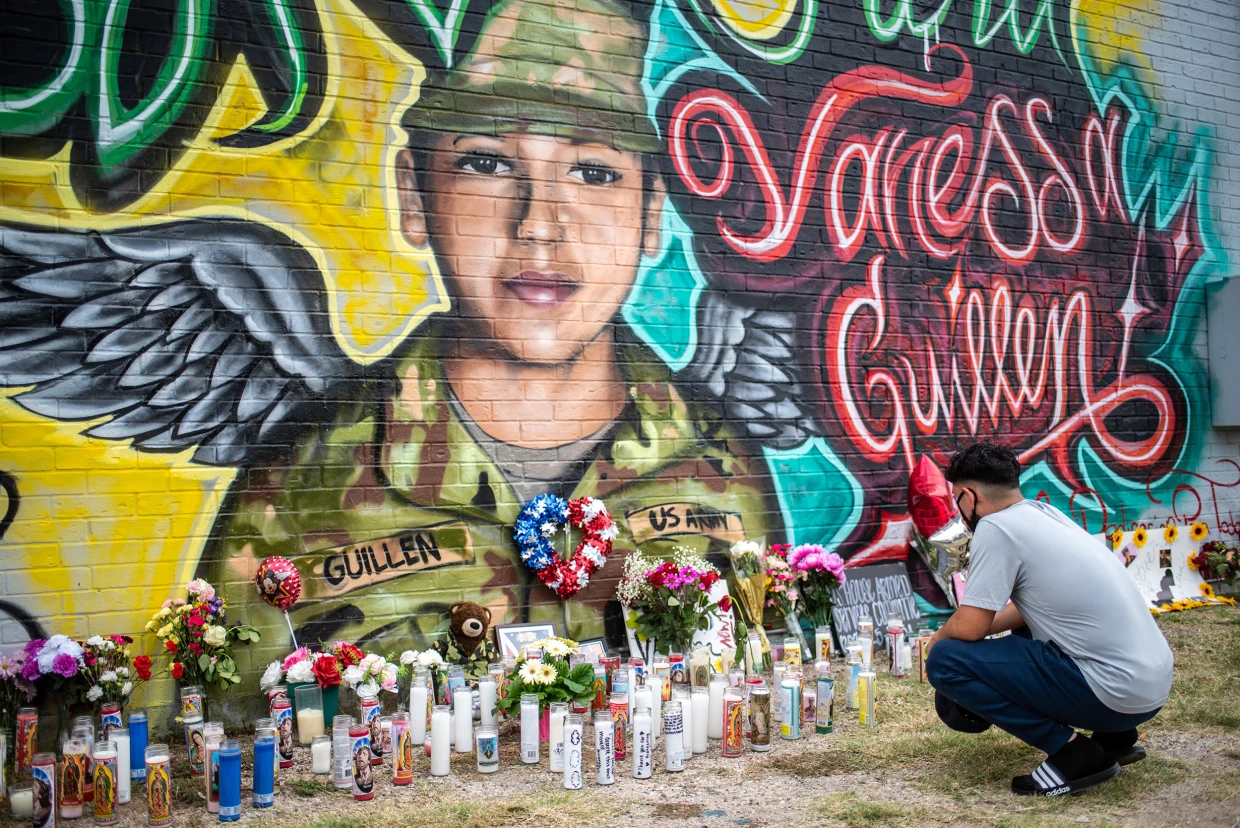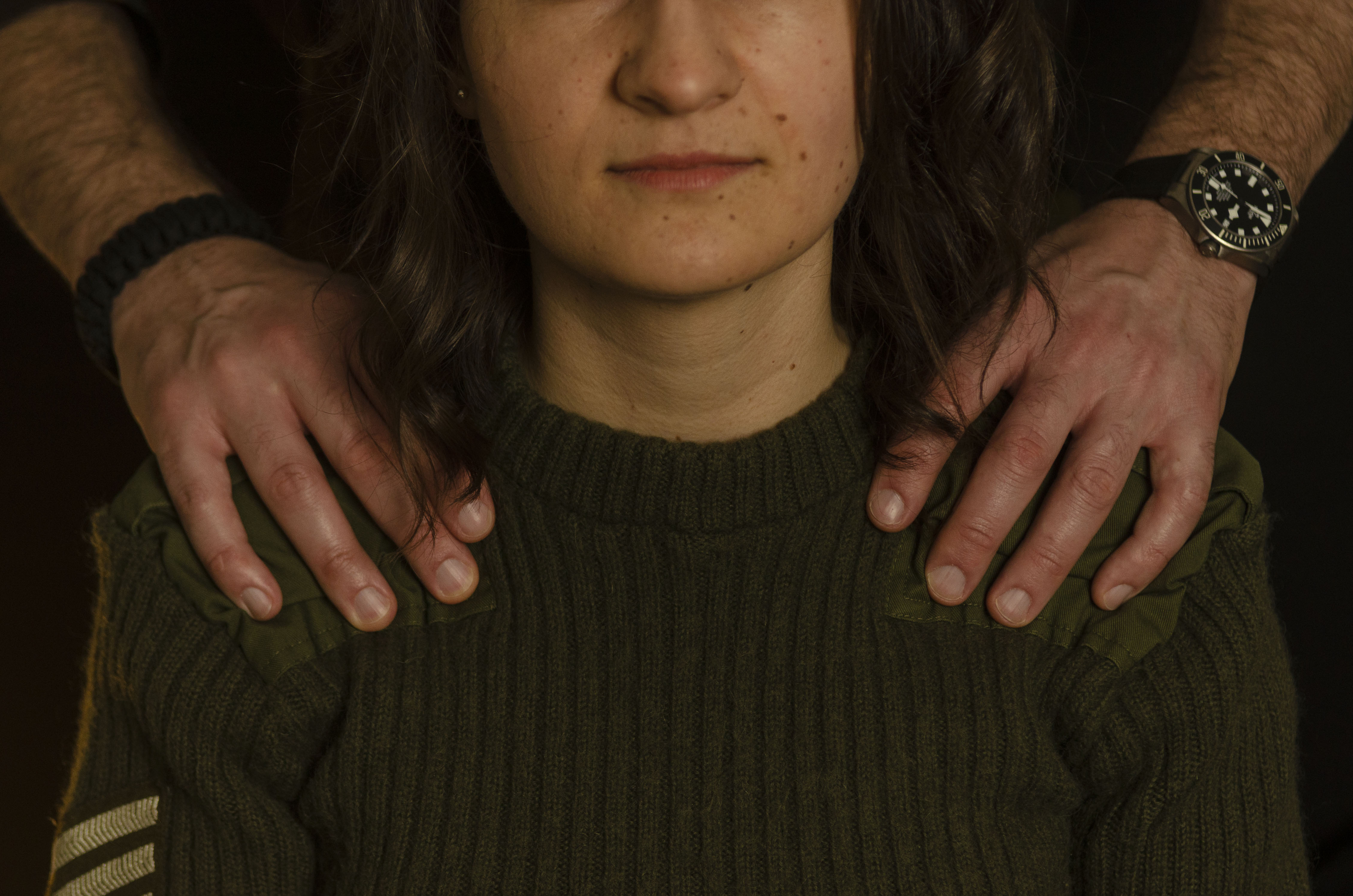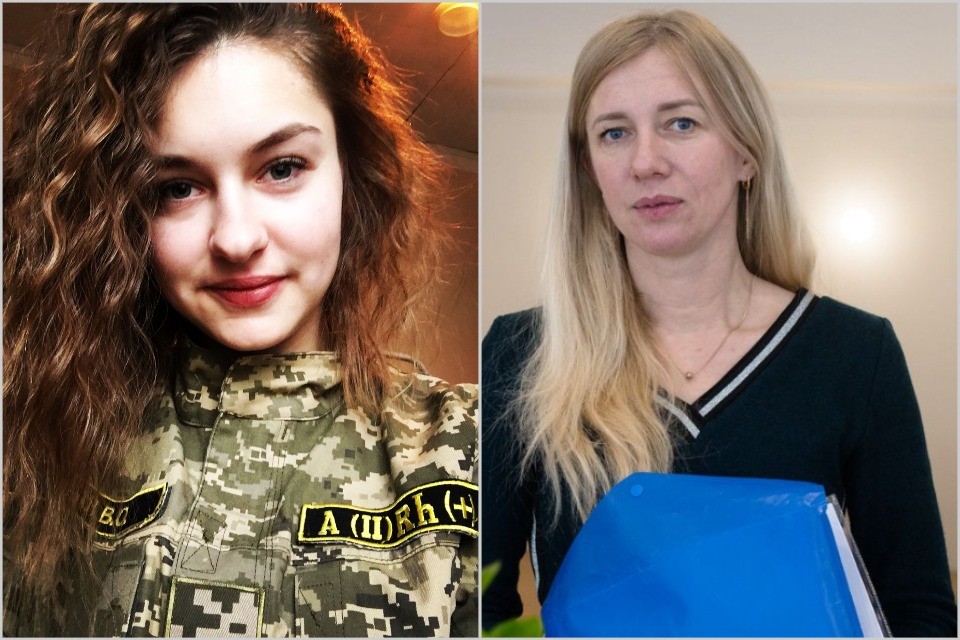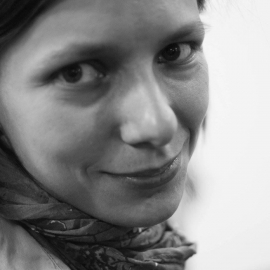The problem of sexual harassment and sexual violence in the military exists in armies around the world. It affects not only women, although women suffer from it more often. American researchers Valerie Stander and Cynthia Thomsen believe that sexual harassment is facilitated by inherent factors of the military structure, such as the acceptance of violence in general, deindividualization, complete subordination to leadership, and the still widespread male dominance in this leadership.[1]
Other researchers, such as Carl Castro, argue that well-developed stress resilience results in less reports of violence, and that team spirit puts pressure on victims and makes them think that by reporting violence they are “betraying” their team.[2]
The institutional pre-condition that makes harassment or violence against others possible is a position of power. The army in general is a hierarchical structure, and the higher the person in this hierarchy is, the more opportunities they have to commit violence without consequences. The “glass ceiling” still exists in this area, so top positions in the army are occupied mainly by men.
Sexual harassment is also part of broader issues such as misogyny, toxic masculinity, gender discrimination, lack of professionalism, and, in the case of the Ukrainian army, the Soviet legacy in professional culture.
“It was a lieutenant colonel. At a long lecture that had absolutely nothing to do with gender, he talked about every possible thing and made a remark that ‘when you are in the army, do not bring women in any case... Never bring women to the training grounds or to the ATO [Anti-Terrorist Operation – Editor] because everyone will fuck them except you. Mark my words, I’m telling you, you’re young, inexperienced – never take them to the training grounds, because everyone will fuck them except you.”[3]
The problem of sexual harassment is accompanied by related negative phenomena, such as homophobia and transphobia, with the use of bullying and violent behavior by men against men.
The existence of sexual harassment cannot be a reason to discourage women from serving in the military, on the grounds of “protection.” Just as sexual harassment in a civilian job is not a reason to discourage women from earning their own money. However, harassment in the military differs from harassment in the office or at work, primarily because it is not as easy to resign from military service on the grounds of harassment as it is from a civilian job. In addition, the lack of resolving this problem can demotivate women who would like to serve in the first place, and the Ukrainian army needs volunteers.
The appropriate way to solve the problem is to create effective mechanisms to combat harassment, gender-based violence, bullying, sexism, and discrimination in general. A proper, friendly, trusting atmosphere is the key to effective service for both women and men.
Exposing the issue of sexual harassment and sexual violence to the public cannot delegitimize the entire Ukrainian army, nor can it delegitimize other armies in the world. This is not only my opinion, but also that of Ukrainian society. In 2020, the Kyiv International Institute of Sociology commissioned the Invisible Battalion project to conduct a national representative survey, implemented by the non-governmental organization (NGO) Institute of Gender Programs. According to the survey, 23% of respondents believed that exposing sexual harassment in the army was worthwhile because it was a problem often ignored by the leadership of the Armed Forces; 24% said it was worthwhile because it was perhaps the only way for victims to achieve justice; another 8% said it was worthwhile because discrimination in the Armed Forces exists. Only 17% of respondents believed that publicity can harm the victims, and only 8% explained that publicizing such problems harms the image of the Armed Forces.[4]
The problem of sexual harassment has also been recognized at the level of the General Staff of Ukraine. Viktoriia Arnautova, Gender Advisor to the Commander-in-Chief of the Armed Forces of Ukraine, publicly stated, “The Armed Forces need to recognize as a civilized institution that this phenomenon exists and respond adequately.”[5]
International experience
A 2015 study of NATO member states’ armies found that 80% conducted regular training to prevent sexual harassment and violence in the military, and more than 60% had policies formal procedures in place and trained personnel to prevent and record complaints of sexual harassment of women or men.[6]
Let’s take the U.S. Army as an example. The problem of sexual harassment is monitored by keeping statistics on complaints received and through an annual anonymous survey of gender and workplace relations. The first number is much smaller than the number of those who report harassment anonymously: according to 2012 data, 6% of American female soldiers filed complaints about harassment, and about a quarter of them were harassed. Among men, 1% reported harassment through a complaint, and 10% reported it anonymously. The 2018 data showed similar proportions; however, because the problem had been exposed, the number of complaints increased significantly.
The American experience emphasizes the importance of preventive work and the important role of the unit commander, who should lead this work, facilitate complaints, and, in general, be responsible for a healthy working atmosphere in the unit. Where the commander is insensitive to the issue of sexual harassment, the risks increase.[7]
In 2020, the case of Vanessa Guillen, a 20-year-old servicewoman who disappeared while on duty, gained publicity in the United States. She had previously told her family that she was being sexually harassed by a sergeant, that complaints against him by other female victims had been rejected, but that she would solve her problems herself. Two months later, the remains of her body were found. The killer was U.S. Army Specialist Aaron David Robinson; his girlfriend, Cecily Ann Aguilar, helped dismember the body and hide the remains. Robinson shot himself during his arrest, and Aguilar was sentenced to 30 years in prison.[8] The investigation concluded that the murder was a direct result of leadership failure and a climate of indulgence in sexual violence and harassment at the military unit. Fourteen other soldiers were disciplined.[9][10] As a result of the Vanessa Guillen case, sexual harassment was included as an offence in the Uniform Code of Military Justice in 2022.

Mural in memory of Vanessa Guillen
In Canada, about a quarter of female service members experience harassment or violence during their careers, while the figure for men is about 4%. About three cases of sexual harassment or violence occur every day. After an independent study published a report on “a culture hostile to women and LGBT+ people in the military,” Canadian servicewomen and veterans filed lawsuits against the Ministry of Defense for two years (2016-2017). Many of them received financial compensation after a court decision. The problem of sexual harassment in the Canadian Armed Forces was declared a threat to national security. The Standing Committee on National Security and Defense of the Senate of Canada believes that a culture of conformity, hierarchy, unquestioning obedience to orders, and placing group interests above individual ones created an atmosphere conducive to sexual harassment and violence. To remedy this situation, it is necessary to influence this culture, not just increase the number of women in the army.[11] Between 2015 and 2021, Operation Honor was conducted to comprehensively study the problem and look for ways to solve it.
In 2021, 13 high-ranking officers in Canada were simultaneously suspended, investigated, or forced to retire due to inappropriate sexual behavior. The military police did not disclose the cases on its own initiative, but answered questions from journalists.[12]
Stories from Ukraine
According to a study by the Research Center for Humanitarian Problems of the Armed Forces of Ukraine (2011), 10% of women and 5% of men (mostly cadets of higher military educational institutions) experienced sexual harassment in the army.[13]
In 2020, the authors of the study “Invisible Battalion 3.0. Sexual Harassment in the Military in Ukraine” talked to women who had experienced sexual harassment, sexual violence, sexual violence combined with physical violence, etc. There were cases of offenders damaging personal belongings and even using firearms in retaliation for refusing [intimacy – Editor].
Sometimes, in cases of sexist jokes or other minor conflicts, the perpetrator might not understand why their actions were wrong, even if they had to apologize to the victim at the request of their superiors. Sometimes the victims themselves did not immediately recognize the unpleasant incidents as harassment or sexism, rather than just interpersonal conflicts.
This brings us to the need for education on gender equality and anti-harassment. The Invisible Battalion project team developed a training course on Gender Equality and Combating Sexual Harassment in the Military, which is publicly available on the Prometheus online education platform.[14] By the beginning of 2023, more than 23,000 people had registered for the course (90% of them received certificates), and the Department of Military Education and Science of the Ministry of Defense of Ukraine recommended that higher military educational institutions and military structural units of higher education institutions include the course in their training plans for cadets.
However, it is obvious that systematic harassment of subordinates, sexual violence, physical abuse, threats, and harassment cannot be interpreted only as a lack of gender education, but also must be punished accordingly. The researches also documented cases, as well as the fact that it is rather futile for victims to expect fair punishment for the offender. As a structure that was not ready before the war in Ukraine to recruit women into combat positions and provide them with uniforms, the army was also not ready to respond to sexual harassment. Such problems were sometimes not resolved, sometimes ended in physical conflict with the offender, and sometimes led to the dismissal of women from the ranks of the Armed Forces, thus reducing the combat capability of the army by one qualified specialist. The mechanism of resolving conflicts by appealing to the commander does not work when the offender is the commander himself. Victims usually did not consider the option of calling the general “hotline” of the Armed Forces of Ukraine because of the non-anonymity of such appeals and, accordingly, the risk of worsening their situation.
At the time of the study, only one case of sexual harassment was known when the victim decided to speak publicly and name the offender. In 2018, Lieutenant Valeriia Sikal reported long-term systematic harassment by Colonel Viktor Ivaniv. She stated that when she was serving in military unit A1358, the head of the unit, using his official position, repeatedly tried to force her to have sex. The Main Department of the National Police in Vinnytsia Oblast opened a case of coercion to sexual intercourse. As of early 2024, a verdict had not been reached in the case, and Colonel Ivanov was temporarily promoted and transferred to the Ministry of Defense.[15]
Among the cases that came to the research team’s attention, sexual harassment was most often perpetrated by higher-ranking individuals and without witnesses; most often, men harassed women, although this was not the only possible scenario. Most of the victims did not tell anyone about the sexual harassment and did not seek help; the project researchers were often the first people to whom the victims confided. If any witnesses were present during the harassment, they usually supported the offender or remained neutral, either by not intervening or by declaring that they could not influence the situation. Women, usually, were not offenders themselves, but they did not always support the offended.

Illustration to the study ‘Invisible Battalion 3.0. Sexual Harassment in the Military Sphere in Ukraine’
After the study was published and the topic was brought to the public’s attention, servicewomen began to talk more about this problem. In 2021, Lieutenant Colonel Olha Derkach, an employee of the Chernihiv Regional Conscription and Social Support Center, stated that she had been harassed by her supervisor, Colonel Oleksandr Kryvoruchko, the regional military commissar. As in the case of Valeriia Sikal, a verdict in the criminal case has not yet been delivered.[16]

Valeriia Sikal and Olha Derkach
There have also been public statements in which victims did not name their perpetrators but shared their stories. Servicewoman Iryna Bazykina reported to the media that she had suffered sexual and physical violence. After a year of investigation, no criminal offense was found in the behavior of the perpetrator, and the perpetrator absolved himself by saying that “she likes hard sex.”[17]
In a podcast by the Women Veterans Movement published in early 2024, Svitlana, an aerial reconnaissance officer, shared her story, “I literally got into a fight or a struggle with an officer, a commander, but those people whom I considered friends in that unit, they just left, they came out to let the commander have a good time.”[18]
Communications officer and simultaneous interpreter Nadiya Haran went further and spoke about sexual harassment in the Armed Forces to the British newspaper The Guardian.[19] According to her, she left her unit because of a commander who harassed female subordinates and told them that if they refused to have sex with him, he would send their husbands, who were also his subordinates, to their deaths. The problem was brought into the international spotlight by Deputy Defense Minister Hanna Malyar, who promised to personally respond to the statements.[20] It was not possible to verify her promise because she was dismissed from her post a month later.
Commenting on sexist jokes by a soldier in the 3rd Separate Assault Brigade, the Women Veterans Movement claims that “every harassment case goes unpunished.”[21]
Mechanism for responding to sexual harassment and gender-based violence
In cooperation with the Institute of Gender Programs, the Women Veterans Movement, and the General Staff of Ukraine, the NGO Yurydychna Sotnia worked to develop a mechanism for responding to sexual harassment and gender-based violence in the Armed Forces of Ukraine.
On October 28, 2021, at the Army Built on Trust forum organized by the Land Forces of the Armed Forces of Ukraine, Victoria Arnautova, Gender Adviser to the Commander-in-Chief of the Armed Forces of Ukraine, presented a draft mechanism for responding to sexual harassment and gender-based violence.

Victoriia Arnautova presents a draft mechanism for responding to sexual harassment
The mechanism envisages that the victim (or survivor) or a person who has observed inappropriate behavior reports it in person, in writing, or by phone to the hotline. A designated body (department of the Office of the Assistant Commander-in-Chief for Gender Integration), a designated person (gender adviser), or a commander receives the report, which is registered immediately. The next day, the affected person is referred for legal, psychological, and medical assistance (in compliance with personal data protection requirements). Following the report’s registration, an internal inspection commission is appointed, chaired by a representative of the designated body, and the same person also ensures the victim is protected from the influence of the offender. Based on the inspection or investigation findings, a decision is made to bring the offender to justice.
As of the beginning of the full-scale war, the all the commands had agreed to the mechanism, but it was not adopted and no people were appointed to the gender integration unit positions in the Office of the Commander-in-Chief, who were supposed to perform the relevant duties. As of the beginning of 2024, the situation had not changed.
Current process of actions
What should a servicewoman or serviceman do if she or he is suffering sexual harassment right now? The YurFem Ukrainian Women Lawyers Association developed memo with general recommendations that does not replace individual legal advice in each case but gives an overall understanding of the next steps in the event of a threatening situation.[22]
The first step is to ensure one’s own safety (leave the room, involve witnesses, etc.).
The second step is to record the date, time, and place of the incident; record the position and name of the offender; and collect other information about the situation and evidence.
The next steps are to get psychological, medical, and legal assistance, after which you can agree on your next steps with a lawyer.
According to Article 110 of the Disciplinary Statute of the Armed Forces of Ukraine, in case of your rights being violated, you can file a complaint with both the command and law enforcement agencies.
Sexual violence against servicewomen and servicemen is a military crime and is qualified, depending on the position of the offender, under the following articles of the Criminal Code of Ukraine: Article 426-1 “Excess of power or official authority by a military official”, Article 406 “Violation of statutory rules of relations between military personnel in the absence of a relationship of subordination”, or Article 405 “Threat or violence against a superior.” You should consult with a lawyer to determine the crime’s exact qualification, correctly prepare an appeal, and decide on the correct addressee of the appeal.
NGOs such as YurFem, Charity Foundation Sylni, and Yurydychna Sotnia provide assistance to victims, although, based on the experience of Valeria Sikal, Olga Derkach, and Iryna Bazykina, they cannot theoretically nor practically ensure justice, which is the responsibility of the judiciary and law enforcement bodies.
Conclusions
Sexual harassment and sexual violence is a problem in armies around the world, including the Ukrainian army. This General Staff recognizes the problem. The organization’s hierarchical nature, the inability to quickly change place of assignment, the traditions of the Soviet army, where women served men rather than being their equals, and misogyny all contribute to the abuse of power, including sexual abuse.
Both men and women may not realize that certain behaviors are unacceptable and are defined as harassment; this problem could be overcome by gender education. In other cases, the perpetrator is probably aware that they are doing unacceptable things and should be punished. Nevertheless, a relatively small percentage of victims bring the problem to the attention of the service or law enforcement authorities, and an even smaller percentage raise these issues publicly. The situation is similar in other armies around the world. In Ukraine, there are currently no publicly known cases of sexual harassment or violence in the army where the perpetrator has been punished.
Armies around the world also have mechanisms for responding to reports of sexual harassment and sexual violence. A mechanism for the Armed Forces of Ukraine has already been developed and all commands agreed to it, but its final implementation has stalled. We believe that the process will be completed in the near future.
Photo: Sergio Flores / Getty Images file, Cleopatra Anferova / Invisible Battalion, Povaha, Novynarnia
This project is implemented with the support of the Swedish Institute.
_________________________________________________________________
[1] Invisible Battalion 3.0. Sexual Harassment in the Military Sphere in Ukraine. / Edited by Tamara Martseniuk. Kyiv, 2021. P. 22.
[2] Ibid. P. 22-23.
[3] Ibid. P. 93.
[4] Ibid. P. 137.
[5] Dudko, Olena. Victoria Arnautova: “Gender issues are not only about women’s rights, men often suffer from injustice as well” // Army Inform. 2020. November 7: https://armyinform.com.ua/2020/11/07/viktoriya-arnautova-genderni-pytannya-cze-ne-lyshe-pro-prava-zhinok-chasto-choloviky-tezh-poterpayut-vid-nespravedlyvosti/.
[6] Invisible Battalion 3.0. Sexual Harassment in the Military Sphere in Ukraine. / Edited by Tamara Martseniuk. Kyiv, 2021. - P. 71.
[7] Ibid. P. 58-59.
[8] Texas woman who helped hide U.S. soldier Vanessa Guillén’s body sentenced to 30 years in prison // PBS. August 14, 2023: https://www.pbs.org/newshour/nation/texas-woman-who-helped-hide-u-s-soldier-vanessa-guillens-body-sentenced-to-30-years-in-prison.
[9] Fort Hood: Soldiers fired and suspended after Vanessa Guillen probe // BBC News. 2020. December 8: https://www.bbc.com/news/world-us-canada-55235381
[10] Acevedo Nicole, Kube Courtney. 14 Fort Hood leaders disciplined as probe finds ‘permissive environment for sexual assault’ at Army base // NBC News. 2020. December 8: https://www.nbcnews.com/news/latino/probe-launched-after-vanessa-guill-n-s-death-finds-permissive-n1250372
[11] Invisible Battalion 3.0. Sexual Harassment in the Military Sphere in Ukraine / Edited by Tamara Martseniuk. Kyiv, 2021. P. 67-70.
[12] Burke Ashley, Brewster Murray. A military in crisis: Here are the senior leaders embroiled in sexual misconduct cases // CBC. 2021. October 21: https://www.cbc.ca/news/politics/sexual-misconduct-military-senior-leaders-dnd-caf-1.6218683.
[13] Relevant problems of gender policy in the Armed Forces of Ukraine: Study guide // [V. P. Krotikov, V. L. Topalskyi, V. M. Maliuga, et al.]; edited by B.P.Andresiuk – K.: Research Center for Humanitarian Problems of the Armed Forces of Ukraine, 2011. P 67-68.
[14] https://prometheus.org.ua/course/course-v1:Prometheus+GE101+2021_T2
[15] Goncharuk, Natalia. Did the Colonel accused of sexual harassment defend his honor and dignity? There is a solution // 20 minutes Vinnytsia. 2021. July 20: https://vn.20minut.ua/analitika-i-publicistika/chi-zahistiv-svoyu-chest-i-gidnist-polkovnik-zvinuvacheniy-u-seksualni-11363511.html.
[16] NB 5.0. Monitoring of Recommendations and Research Results from the Invisible Battalion Cycle / Edited by Tamara Martsenyuk. Kyiv, 2023. P. 58.
[17] Sexual harassment: what is happening in the Ukrainian army? (Video) // Radio Svoboda. 2021. March 5: https://www.radiosvoboda.org/a/video-domahannia-v-armii/31136395.html.
[18] Issue 2. An aerial reconnaissance servicewoman, how to protect oneself from harassment in the army // Women’s Veteran Movement. 2024. January 3: https://youtu.be/D0orcKOV-xs?si=LSyQ9RGM5NT3rzj4.
[19] ‘Fighting two enemies’: Ukraine’s female soldiers decry harassment’ // The Guardian. August 4, 2023: https://www.theguardian.com/world/2023/aug/04/fighting-two-enemies-ukraine-female-soldiers-decry-harassment.
[20] Hanna Malyar promised to personally respond to allegations of sexual harassment in the army // Women are 50% of Ukraine’s success. August 15, 2023: https://50vidsotkiv.org.ua/ganna-malyar-poobitsyala-osobysto-reaguvaty-na-zayavy-pro-seksualni-domagannya-v-armiyi/.
[21] https://www.facebook.com/UkrainianWomenVeteranMovement/posts/pfbid033KdMnEacVnAFWTAyK28GYUVzCdYr2c2kj23WkPyufsEfZNdhqiBMn3m2NHrDxN8zl
[22] https://jurfem.com.ua/wp-content/uploads/2022/10/pamyatka-dlya-viyskovosluzhbovyts.pdf

















